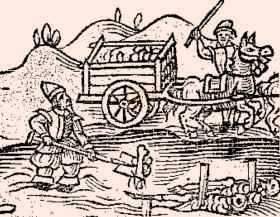Ordinary people
In Hamlet they are not very visible. We hear them as a "noise within" when Laertes storms into the palace to demand revenge for his father's death, and they are represented onstage by the Clown, the gravedigger. The Messenger who explains what the noise is all about is very scornful of the "rabble" that Laertes has gathered to back him up: is this a further implied criticism of the path towards revenge that Laertes takes?
There is a positive presence of the common people in the play as well. Claudius is inhibited in his actions against Hamlet because of "the great love the general gender bear him" (4.7.18). What does this say of Claudius' popularity?
Shakespeare is very much of his time in his attitudes: commoners as a group, especially the poor, were regarded with suspicion and fear.
